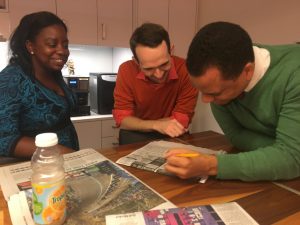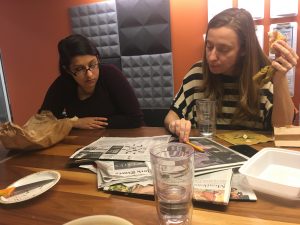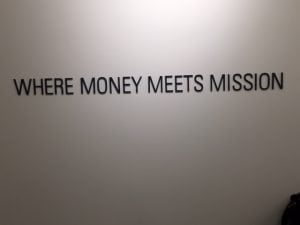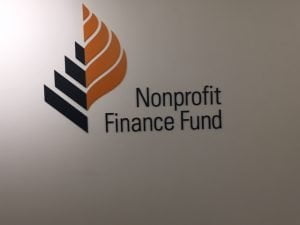Better Than Most is a regular feature of The Business of Giving, examining the best places to work among social good businesses and nonprofit organizations.
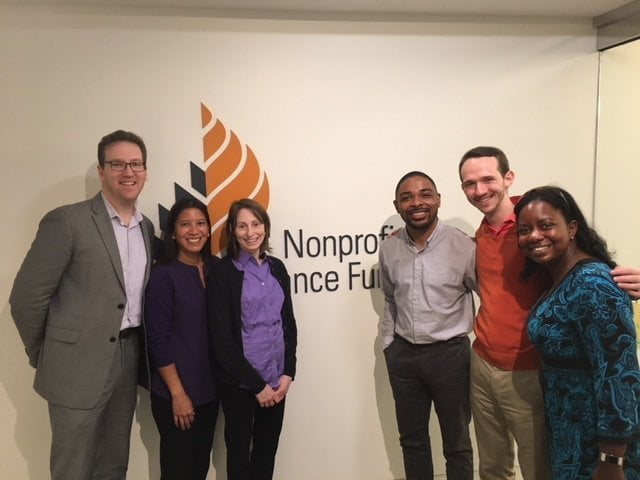
Denver: I didn’t have to travel far for this evening’s Better Than Most. Just over to 5 Hanover Square at Lower Manhattan and the offices of the Nonprofit Finance Fund. NFF, as they’re known, empowers the people and organizations that generate opportunity and hope in underserved communities. We’ll begin with their CEO, Anthony Bugg-Levine and then hear from some of the other members of the NFF team.
Antony: Part of why I believe we are very collegial with each other is the reality that what we do as a Nonprofit Finance experts, leads us, in most cases, unable to explain to our families what we do for a living when we go home for Thanksgiving. And while that can be frustrating or unable to explain to our lift drivers who ask us what do you do? It’s always stressful. It’s stressful for us to get those questions but in that stress, I think we bond with each other knowing that when we leave the offices, we are going to a world that doesn’t quite understand what we do, I think it helps create a sense of camaraderie that at least, when we walk into this office and all the offices around NFF, we are with people who understand and feel like similar passion for both social change and finance which in combination is rare.
Chance: The idea that there are set of values that drive everything that the organization does from our consulting to our lending, to our knowledge and impact. We do everything though these course of our values. One of those values, I encourage you all to look them up on NFF, but one of those are rigor without attitude and being on the consulting side of things with the organization, it’s very important to really walk into any client situation with that in mind. Like having the idea that we’re going to bring some rigorous analysis to bear for any non-profit that we’re working with but we’re going to do that with a way of humbleness and humility that only I think NFF can come into an organization and provide.
Norah: I was going to talk about how we really try to connect everybody on the staff to the mission, and one of the ways that we do that is every 12 or 18 months, we have an all-staff retreat and a core part of that retreat is visiting clients. So, every staff person whether you’re in the accounting department or the marketing department or HR where you might not on a daily basis touch a client, you get the opportunity to go out in small groups and visit clients and see the work that they’re doing and hear about how NFF has impacted their work. I think it makes everybody feel a part of the mission.
Tiffany: Someone brings in the New York Times crossword puzzle, and we do it together as a group during lunch. We actually had someone who was auditing our website, not too long ago, and said, “What is this picture of people around the table with the crossword puzzle? Is this staged?” And I was like, “No, we actually do that. That’s the thing that we do”, is it Mondays and Thursdays, where we sit around. If we’re good, we finish, but we rarely finish it on the day that it’s dropped in. It’ something interesting and fun. People drop in, and we’ll do it for a couple of minutes while they’re heating up their food or grabbing a coffee or while sitting at the table and do their lunch and help as a group do the crossword puzzle.
Anton: Is this going to lead to some useful conclusions and to not be a slave to the data? It’s like one of my favorite quotes and something that I always keep in mind whenever I do any work. I see all these numbers constantly. I see all these spreadsheets but does it work for us? And if it doesn’t, then we need to go back to the drawing board and we need to look at it again, and we need to come up with different ways to think about data. That method of turning numbers into useful information has changed the way that I work, and I have NFF to thank for that.
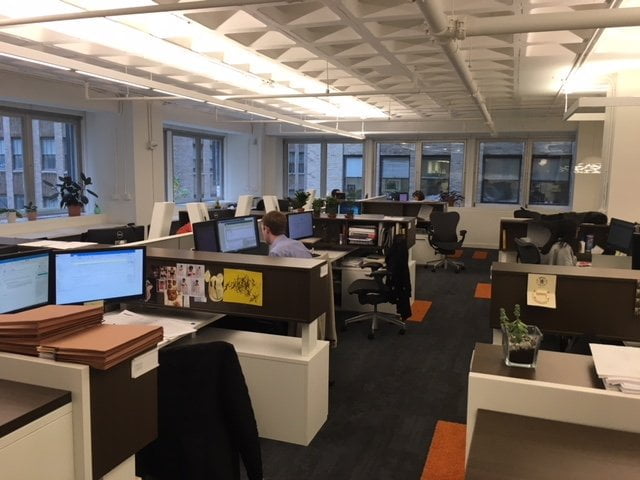
Chance: One thing that we do, I believe it’s quarterly, is a survey, a pulse check among staff members. So, everyone gets a set of questions that are individually tailored to your own department, and it asks basic questions around work-life balance, what’s been the most meaningful aspect of your job. Just having that pulse check-in quarterly for me has been really helpful and seeing how management and leadership really responds to that survey in a way that really informs performance management culture.
Antony: When we moved to our New York office downtown, we created a very simple rule that’s led to pretty interesting culture change around how do you get people from different silos to work together, and that’s this very simple rule that says, you don’t take food out of the kitchen which we really put in place not only for cultural reasons but also for maintenance reasons. No one wants unwanted guests in the office. But that simple change has resulted in people coming together based on when they eat rather than naturally what business unit they’re in. If you’re going to be having your lunch, you’ll be having lunch with people from departments you might not necessarily see but that simple cultural change is something I would certainly take with me if I went to another organization.
Kristine: We actually put a term to it in our session. We thought that we’re going to call the session fabulous flops like in the retreat, and then as we were working on the session, I realized that well you know, to call it a flop, it kind of implies that something went wrong or it went badly and that’s not really what we were going for. So, I looked up the term flopulous just on a whim, and it turns out it is a term in Wikipedia that is about, the term is actually about taking something that went a different way and actually flipping it over into something really positive and valuable in terms of learning. It’s a term that stuck. Intermittently at the retreat, we do hold that session as time to share lessons learned.
Norah: I’ll talk a little bit about the silos because every organization has its silos and we’re really no different. But I think that often in organizations, silos come about because people are holding knowledge and information as power. And I think here, that’s not the driver or the cause of it. Really it’s because everybody is so busy they sort of have their heads down. But some of the things that we do to combat that is we have working groups that cut across departments and organizations so people share that way. You certainly overhear people talking and you can go and I think the best is when you do that, it’s complete transparency is the response you get. “Oh yeah. Oh, I didn’t tell you? Oh, I’m sorry. Here’s what we’re doing there.” And people really do want to share their work and share what they’re doing. So, there’s just a culture of trying to break that down here that I find really sort of encouraging.
Tiffany: So, I was super excited to be in this workshop about diversity, equity and inclusion but I was very skeptical. And as part of that, and there were a lot of sort of those role playing, there was a lot of discussion about different words and things like that, but leaving that meeting about 90 minutes later, one of the things that I realized was it wasn’t just paying lip service. Right? It wasn’t just doing it because all the cool kids are doing it. It really felt like, and it’s a process and at the time when I went to that meeting a few months ago, I think we were a year into it and we’re still working through it but I think the ultimate goal is to really incorporate those ideas into the work that we do not just in our hiring practices but also in the clients we work with and how we work with them.
Anton: There has always come through this interest in helping or interest in getting me to learn something new or getting me to participate in a new project and never have I faced a barrier to exploring a new opportunity with NFF or just getting a little bit more involved in the work that I normally wouldn’t get involved in. And I feel like everyone has always been very accommodating of my interest in exploring nonprofit to the fullest. So, I really think that generosity is very prevalent throughout the organization and people, day-to-day, continuously show to me that we are really focused on our mission but we’re also focused on making everybody feel included and interested in the work and it’s pretty phenomenal.
Kristine: I find that NFF just recognizes that when people can bring their whole selves to the work with the least amount of stress, or just baggage or worry that distracts them from the work, you actually get like the best from what each person has to offer.
Antony: We had a young colleague leave NFF and in his letter to his colleagues when he was leaving to say that he was leaving moving on. He described all of us as badass dorks which I thought capture a lot of what we’re about. I’d say, just to add and we are badass dorks with values.
Denver: I want to thank Jen Talansky for organizing my visit and for all those who participated in this segment: Norah McVeigh, Tiffany Langston, Anton Leynov, Chance Craig and Kristine Alvarez.
If you’d like to hear this again, read the transcript or see pictures of the participants in the NFF offices, you can do so by visiting denver-frederick.com and while you’re there we’ll put up a link to my full interview with Antony Bugg-Levine, the CEO of the Nonprofit Finance Fund.
The Business of Giving can be heard every Sunday evening between 6:00 p.m. and 7:00 p.m. Eastern on AM 970 The Answer in New York and on iHeartRadio. You can follow us @bizofgive on Twitter, @bizofgive on Instagram and at http://www.facebook.com/BusinessOfGiving


